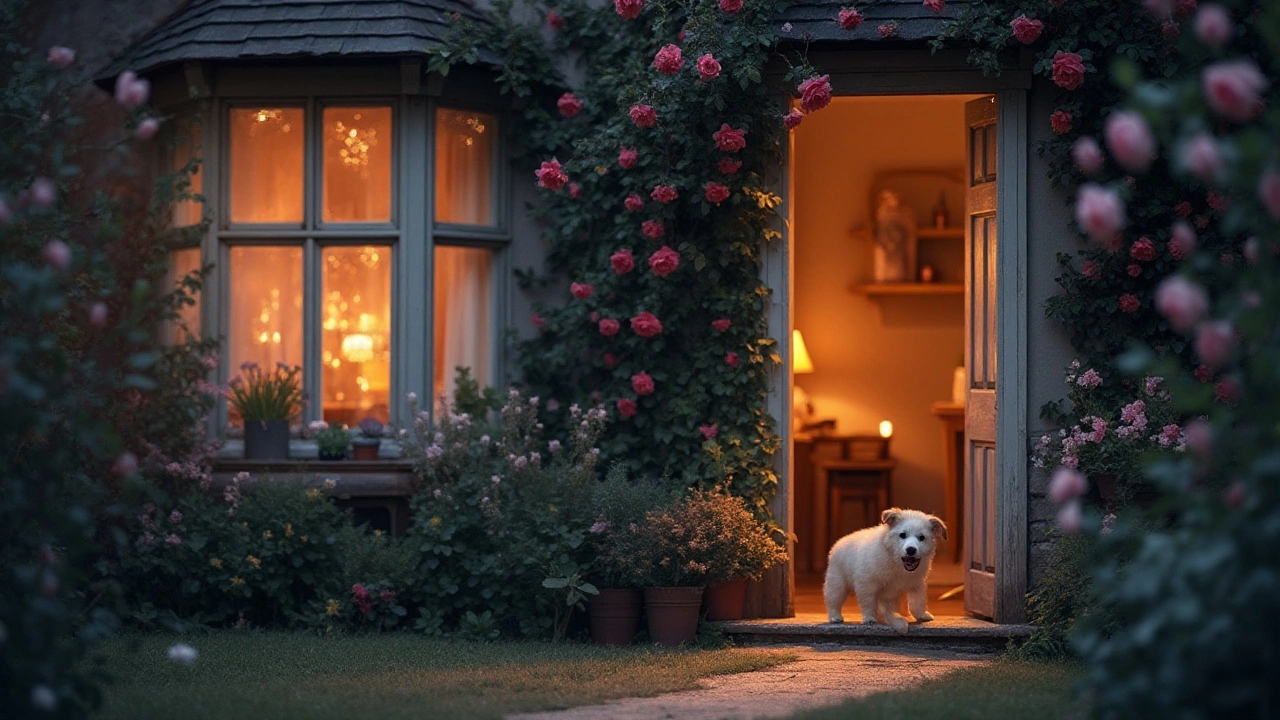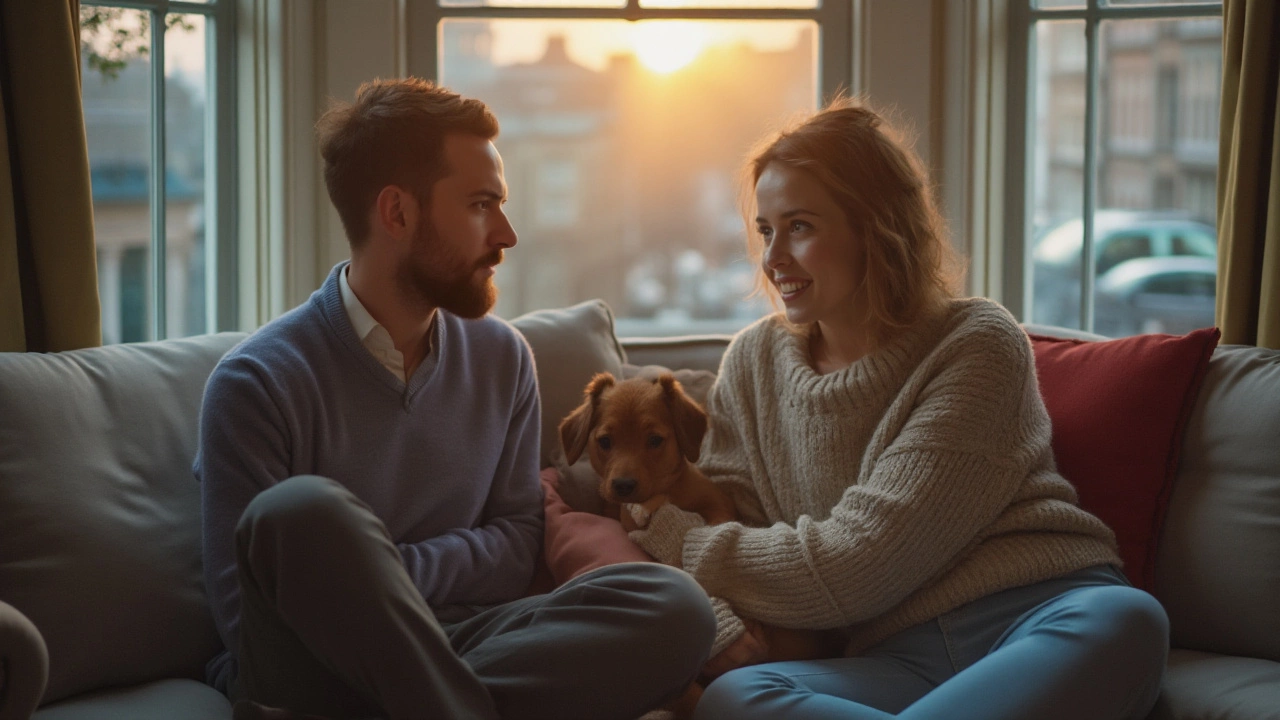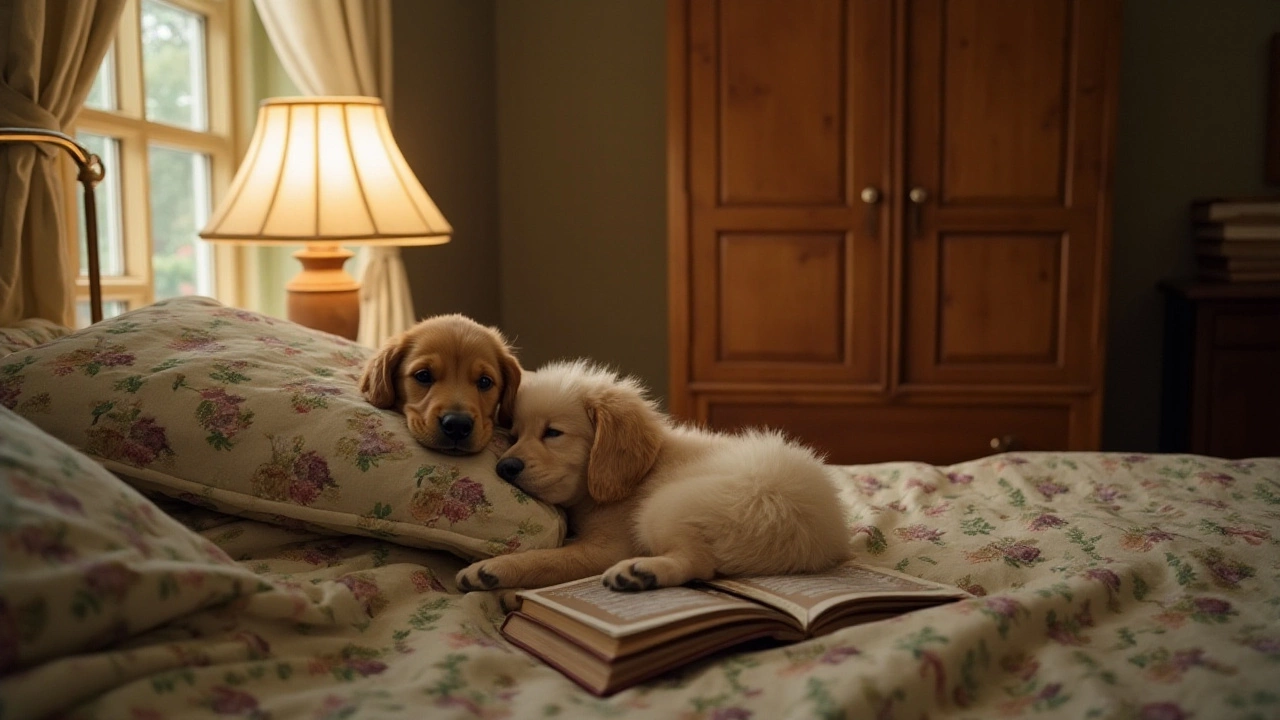Bringing a puppy into your home is like welcoming a new family member, complete with lots of joy and just as many questions. One common question puppy parents face is whether to let their little fluff ball share the bedroom. This choice can shape your pup’s bedtime routine, and it's important to weigh the pros and cons.
In this article, we'll dive into the comfort and confidence that a nearby sleeping arrangement can offer your pup, as well as the potential for sleep disruptions. We'll explore how to create the most soothing sleep environment and when to begin encouraging your puppy to sleep independently. Whether you're seeking a deeper bond or wish to establish early boundaries, this guide will help you make an informed decision for peaceful nights ahead.
- Understanding a Puppy's Needs
- Benefits of Sleeping in the Same Room
- Potential Challenges
- Creating the Perfect Sleeping Environment
- Transitioning to Independent Sleeping
Understanding a Puppy's Needs
When you bring a new puppy into your home, understanding their fundamental needs is crucial to ensuring their wellbeing and happiness. Puppies, in their early stages, are much like babies, driven by instinct and requiring a nurturing environment where they can thrive. To start, a puppy's need for security cannot be understated. They are transitioning from the warmth and comfort of their litter to a completely new environment. During this initial period, being near their human companions at night can provide a significant sense of reassurance. This proximity can help reduce stress, which in turn can foster a more peaceful sleep routine.
Moreover, puppies are highly social animals. They have been used to snuggling closely with their mother and littermates, and this physical closeness is deeply embedded in their nature as a source of comfort. When a puppy is brought into a household, it can often feel lonely, especially at nighttime. Being able to smell, hear, and perhaps even touch their owner in the same room may recreate some of that comfort they might have experienced with their original family. According to veterinary behaviorists, the first few weeks are critical in setting the stage for a puppy’s future behavior, and providing a secure space helps them to develop trust and emotional security.
“Dogs have a social structure that is very important to their well-being. For puppies, being close to a family member is more than just warmth—it's a survival mechanism,” notes Dr. Karen Becker, a respected veterinarian focused on holistic health.
Alongside this need for security, puppies have a biological requirement for frequent potty breaks during the night, due to their tiny bladders. This physiological need can greatly influence the decision to keep your puppy in the same room for easy access. By being in the same space, you can better respond to their cues, ensuring that potty training can proceed smoothly. Additionally, this not only aids in reinforcing good habits but also helps minimize any nighttime mishaps that could cause stress for both puppy and owner. Perhaps surprisingly, sharing your sleeping quarters with your new furry friend can expedite their adaptation to the household and lead to a more consistent nighttime routine.
Another aspect to consider is the puppy bedtime routine. Establishing a consistent routine is central to training and behavioral development. Puppies thrive on routine. Regular schedules for feeding, play, rest, and bedtime can provide the structure that helps them settle down physically and mentally as the day winds down. This preparation aids in preparing the puppy for a restful night of sleep. In fact, many puppy experts suggest that the predictability of routine establishes a sense of order, which can lower anxiety and create a more serene atmosphere as bedtime approaches. This routine includes not only the timing of these activities but also the environment in which they occur. Providing a dedicated sleep space—whether it involves a cozy crate or a soft bed beside yours—can make a substantial difference in how well your puppy adjusts.
Lastly, it's important to recognize the emotional needs of a puppy. Just as humans seek companionship, puppies, with their social nature, benefit from interaction and attention, especially during this adaptation phase. This emotional connection fosters a positive relationship and encourages confidence. At the same time, it is also a perfect opportunity to begin gradual training in setting boundaries, teaching the puppy that although their human companion is close, independence is also a critical part of their development. Hence, balancing closeness with the encouragement of self-soothing behaviors is a delicate yet essential part of integrating a new puppy into its home environment.
Benefits of Sleeping in the Same Room
Sharing a room with your new puppy provides a unique opportunity to quickly create a bond filled with trust and affection. In these early days, puppies, having just left the comfort of their litter, might feel anxious or scared. By having you nearby, your presence offers them a sense of security. This closeness helps ease their transition into your home, reassuring them during vulnerable moments, especially through the unfamiliar nights. Puppies thrive on companionship, and your nearby presence fulfills their natural inclination as social animals, ultimately fostering an early and deep connection.
Additionally, sleeping close by allows you to respond promptly to your puppy’s needs, whether it is a midnight potty break or a comforting word to soothe their whimpers. This immediate attention not only helps maintain your puppy's physical well-being but also encourages their emotional growth. With your attentive care, problems such as crying and stress can often be minimized, leading to better rests for both you and your pup. Engaging with your puppy at night cements a routine they can understand and look forward to, making each night's transition smoother and setting the pace for a calm living environment.
Puppy bedtime routines, when shared, can also serve as the perfect moment to introduce consistent training. For instance, teaching commands like 'quiet' or 'settle' can be effectively reinforced during nighttime interactions. By rewarding your puppy for calm behavior, you're able to instill discipline early on without making it feel restrictive. This method also gradually establishes a sense of independence in your puppy where they learn to trust you will be present when needed. Such consistency builds a feeling of safety, both mentally and emotionally, which is essential for their overall development.
Interestingly, a study published in Modern Dog Magazine highlights how proximity at night can alleviate separation anxiety. Results showed puppies who initially shared a room with their owners adapted more efficiently to eventual solitary sleeping, compared to those who started out alone. This gradual introduction to comfort zones reduces dependency yet boosts confidence, balancing nurturing with growth.
"Allowing a puppy to sleep in your room significantly decreases their stress levels and promotes a healthier, happier life," noted Dr. Jane Miller, a renowned canine behaviorist.
Moreover, for the owners themselves, having a puppy nearby at night can be a delight. The charm of gentle snores or the warmth of their tiny body often adds a layer of comfort and joy to your nighttime routine. It can be quite endearing to experience your puppy's growth in real time, seeing them learn to settle, and knowing that your love plays a central role in their peaceful sleep. These shared experiences not only enrich your life but build a legacy of love and loyalty that defines pet companionship. So, if you're pondering whether or not to keep your puppy close at bedtime, the advantages certainly make for a compelling invite to share those sleepy hours together.

Potential Challenges
Sleeping in the same room as your puppy can present a variety of challenges that pet owners might not immediately anticipate. One of the primary issues stems from the fact that puppies, like human babies, have their own unique sleep patterns that may not align with ours. Puppies tend to be light sleepers and may wake multiple times during the night, especially during the first few weeks when they are still adjusting to their new environment. This can lead to interrupted sleep for you as they whine or move around, seeking comfort or needing to relieve themselves. Unlike older dogs, puppies have smaller bladders, and their need to urinate frequently could lead to nighttime awakenings that can disrupt your sleep cycle.
Puppies can also have a tendency to become overly dependent if they sleep too close to their human companions for extended periods. This can create a scenario where your puppy struggles to self-soothe or remain calm when they are alone, potentially leading to separation anxiety. It's crucial for puppies to learn to be independent and secure in their own space, and too much time in your room at night might hinder this valuable learning process. Behavioral experts often stress the importance of striking a balance between comforting your new furry friend and allowing them to grow in confidence.
Dr. Sophia Yin, a respected veterinary behaviorist, once noted that "it is important for puppies to learn that being alone is a normal part of life and shouldn’t be feared."
Beyond these behavioral challenges, there’s the practical aspect to consider. Puppies are naturally curious creatures, and having them in your bedroom might be an invitation for middle-of-the-night exploration and potential destruction. They might chew on furniture, scratch at doors or walls, and turn your personal space into a playground when left unattended even for a moment. To mitigate these risks, you'll need to puppy-proof your bedroom as thoroughly as any other area of your home, which can be an added task for already busy puppy parents.
Some puppies may also inadvertently disrupt the sleep of other family members, especially if schedules are not aligned perfectly. The noise and movements can disturb the sleep of others in the house, including your partner or children, adding another layer of complexity to your sleeping arrangements. Additionally, letting your puppy sleep in your room requires consistency and routine, which can be difficult to maintain with fluctuating family schedules or travel plans.
Finally, the question of hygiene cannot be overlooked. Puppies, as adorable and cuddly as they are, also carry a potential for fleas, ticks, and other unwanted guests that could find their way into your bed or bedroom area. Regular grooming and healthcare routines are necessary to minimize these risks, but they are worth keeping in mind when deciding whether your puppy should be a nighttime companion in your room. The challenge is to ensure that the benefits of having your puppy close at night outweigh these potential hurdles, striking a harmonious balance that works for both you and your pet.
Creating the Perfect Sleeping Environment
Designing a cozy sleeping area for your new pup is essential for their comfort and well-being. Puppies, much like babies, thrive in environments where they feel safe and secure, so the first step is to choose a spot that's both warm and familiar. Ideally, it should be close enough for them to sense your presence, as this can significantly ease their anxiety and help them adapt to their new surroundings. Your chosen location should be away from drafts, direct sunlight, or noisy household traffic, which can disrupt their much-needed rest. Consider placing their bed or crate in a corner of your bedroom or a quiet part of the house that's easily accessible for you during those inevitable nighttime potty breaks.
When it comes to selecting a puppy bed, think about softness and support. Your puppy's sleeping area should include a comfortable, appropriately-sized bed that provides enough space for them to stretch out completely. Many young dogs enjoy snuggling into beds with raised sides, which mimic the feeling of snuggling up with their littermates. Be sure to choose a bed with washable covers, as accidents are bound to happen during their training period.
Ensuring your puppy feels comfortable is critical, but providing familiar scents is just as important. Introducing blankets or items with the scent of their mother or siblings can provide great comfort during the initial nights. A ticking clock wrapped in a soft towel placed nearby might also help mimic the heartbeat of the puppy’s mom, providing a soothing rhythm that can lull them to sleep. These small touches can help reduce separation anxiety and ease the transition from litter to home.
Puppies are inquisitive beings, and keeping them entertained and mentally stimulated during the day will lead to better sleep at night. Consider offering chew toys or puppy-safe items within their reach when settling them down, just not in the bed itself, to prevent midnight chewing disruptions. Remember, a tired pup is a sleepy pup, so adequate playtime is invaluable in promoting healthy sleep patterns.
"A puppy’s environment plays a crucial role in shaping their behavior and development," advises Dr. Chris Hibbard, a renowned veterinarian and animal behaviorist. "Creating a predictable, calming bedtime routine not only sets the foundation for good sleep habits but strengthens the bond between you and your puppy."
Finally, establish a consistent bedtime routine. Puppies benefit from routines that signal quiet time; for example, dimming the lights, reducing loud sounds, and engaging in calming activities. Avoid high-energy games or meals right before bed, as these can lead to restless nights. Over time, these predictable cues will help condition your puppy to recognize when it's time to wind down and settle for the night.
With patience and planning, crafting the perfect environment for your new pup is possible. A thoughtful setup that balances the needs for warmth, comfort, and emotional security will not only ensure your puppy receives restorative sleep but will lay the groundwork for a trusting and nurturing relationship with your furry friend.

Transitioning to Independent Sleeping
As your puppy grows, one of the milestones both of you will reach is transitioning them to sleep independently. Establishing a separate sleep routine is not just about gaining more bed space, but it’s an essential step in developing your puppy's confidence and independence. The process doesn’t have to be a struggle and can actually be quite smooth if approached correctly and patiently. It's important to consider the individual personality and temperament of your puppy when making this transition. Puppies with a strong attachment might require more gradual steps, while others might adapt more quickly.
Start by gradually moving your puppy's bed or crate further away from your bedside. This can be a couple of feet each week until they are comfortable in their designated sleeping area. Puppies thrive on routine, so keep the same bedtime rituals you’ve developed together; this might be a short play session, a potty break, or some gentle quiet time before lights out. Puppy bedtime routines help signal to your puppy that it's time for rest, even if the location is changing. Be sure to celebrate small victories and show them love for sleeping on their own.
Another strategy involves making the alternative sleeping environment enticing. Fill their space with favorite toys or a comforting blanket with your scent. This connection helps ease the anxiety that some puppies feel when sleeping alone. Positive reinforcement goes a long way in instilling confidence; praise and small treats for staying in their bed through the night can be powerful motivators. Remember, patience is critical during this time. Expect some nights to be harder than others, but keeping a consistent approach will lead to success over time.
According to the American Kennel Club, "Consistency and positive reinforcement are the keys to successful puppy training, including establishing night-time routines."
An important fact to remember is that the transition might not happen overnight. Research shows that puppies, especially those of breeds known for close companionship, might need a few weeks to fully adapt to solitary sleeping. Be mindful of their progress and adjust your approach if necessary. If your new puppy sleep routine involves crate training, ensure the crate is a positive space and not used for discipline. Understanding your puppy's breed traits and natural inclinations can aid in creating the ideal sleep setup.
Tracking Your Puppy’s Sleep Progress
Keeping track of how your puppy responds to the transition can be beneficial. You might want to note how they behave in the morning: are they nervous, or do they seem well-rested and happy? This feedback is a powerful tool in adjusting your methods. Some pet parents use minor technology aids like puppy sleep monitors to examine sleep patterns and get valuable insights into sleep quality and disturbances. These can highlight areas where you might need to improve your puppy's sleep routine.
This transition period can be as rewarding for you as it is for your puppy. Watching them grow in confidence and happiness when they succeed at such a significant shift is gratifying. They're learning that it's okay to be on their own, fostering independence that will benefit their overall development. And as Lachlan often reminds me, though waking up to puppy kisses is a special joy, giving them the tools to thrive is a reward in itself. With love, perseverance, and a little patience, your puppy will come to love their own space just as much as snuggling next to you.

